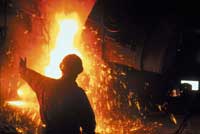Aug 25 2008
Balli Steel has reported that in the last 12 months, global steel prices have increased by 100% and now range from around $1,000 to $1,500 per tonne. The company highlights that global annualised steel production has reached a record 1.4 billion tonnes, up from 800 million tonnes in 2000.

Balli Steel indicated that global steel trading demand is for two types of steel products: construction steel - beams, bars and mesh, used for infrastructure projects, offices, housing and leisure facilities - and industrial steel - used for manufacturing items such as automobiles, ships and pipes. The company revealed that the construction activity in emerging markets including China, the Middle East and Brazil, has been driving the price of steel over the past few years.
Balli Steel calculates that there will be continued buoyancy and capacity constraints for steel in the oil, shipbuilding and gas industries. They also highlighted the tremendous growth opportunities in emerging markets which now account for over 75% of global steel consumption.
China now dominates the world's steel market, accounting for 45% of global steel consumption, up from just 30% 10 years ago. China has also emerged as a leading steel producer, with steel production expected to reach 550 million tonnes in 2008, up from approximately 200 million in 2000.
Balli Steel stressed that the Middle East is a strong market for the steel industry, with the market growing at a rate of 3.2% per annum, one of the fastest in the world.
In 2001 construction steel in the Middle East was priced at just $200 per tonne, but in 2008 it has peaked at $1,550 per tonne. The majority of the demand is for construction steel, required to help build the property mega projects such as The Palm Jumeriah, the Burj Dubai and Dubai Marina.
In the first half of 2008, Balli Steel supplied almost 1 million tonnes of steel to the Middle East. Since developers have now priced steel and other construction commodity prices into their forward development plans, the company does not anticipate further cost pressures, enabling Balli to anticipate a continuing healthy demand for steel until 2012 due the construction boom in the region.
Balli Steel believes that whilst the Dubai property market has grown significantly and emerged well ahead of other property markets in the region, the next 5 years will see the rapid growth of new property markets in Saudi Arabia, Qatar and Abu Dhabi.
The company highlighted that Saudi Arabia has not commenced construction on any of its major masterplan projects, which will add some 5 million tonnes per annum to the country's steel requirement.
India is predicted to be one of the world's fastest growing economies and producers of steel over the next 7 years, currently accounting for 50 million tonnes of steel, and Balli Steel calculates that this will double by 2015, driven by a huge demand for industrial steel.
Europe, which accounts for some 17% of global steel consumption, has been growing at a steady rate of 2% per annum. The steel markets in the southern European states are driven by a demand for construction steel, whilst the northern European countries are dominated by a demand for industrial steel products.